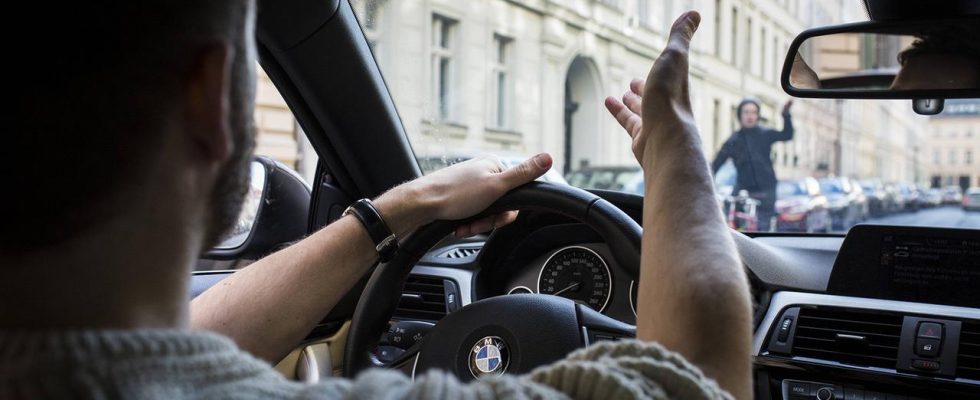Things are becoming more and more aggressive on Germany’s roads. This is what road users report in a survey conducted by insurers’ accident research. Half said they occasionally vented in traffic after getting angry.
People in German traffic show aggressive behavior more often than in previous years. This was the result of a current survey by the O.trend institute on behalf of insurers’ accident research. 56 percent of those surveyed said that at least occasionally they have to react immediately after anger – for example, by driving faster than usual.
“With this question you should actually say clearly: ‘No, that’s not the case.’ The car is not an appropriate place to release aggression,” said Siegfried Brockmann, head of accident research at the insurer.
Brake, flash lights, tailgating
In response to the statement “If the person behind me pushes me, I briefly hit the brakes to annoy them,” 44 percent said that this applied to them – here too, all responses were summarized except for a clear no. 21 percent said that they sometimes flash their lights and turn signals when overtaking on the highway – an increase of nine percentage points compared to 2016.
Around 31 percent said they occasionally step on the accelerator when being overtaken. 34 percent said that they sometimes drive closely behind “notorious left-hand drivers” so that they clear the fast lane – an increase of eight percentage points compared to 2016.
“To accept the injury or even death of others out of anger or for your own benefit is completely unacceptable,” explained Brockmann. “All those responsible must now discuss how the situation can be improved in the light of the results.”
Differences in self and External perception
Accident researcher Brockmann explained that, in his opinion, there is a trend towards more aggressive behavior in Germany overall – and that this does not stop at traffic. This is shown by the comparison with previous studies from 2016 and 2019.
According to the study, most road users recognize aggression as a problem, but most lack awareness of their own involvement in it. Self-perception and external perception are far apart. 96 percent of all drivers answered that they would overtake cyclists at a sufficient distance. At the same time, however, they stated that they perceived that 93 percent of other drivers had a safety distance that was too small.
Cyclists’ self-awareness is similarly lacking: almost half of them admit to occasionally moving onto the sidewalk, but observe this behavior in 92 percent of other cyclists.
The majority of road users in Germany still feel safe or very safe on the road. The value increased slightly from 55 percent in 2019 to 56 percent. In general, men (64 percent) feel significantly safer than women (49 percent).
Zero alcohol limit and slower speed
In order to improve the safety situation, the most frequently requested measure is a zero alcohol limit with regard to alcohol consumption – by 68 percent of those surveyed. However, this value was eight percent higher in 2019.
In comparison, stricter speed limits are viewed much more critically. 41 percent of people supported a speed limit of 30 km/h in cities as a measure for greater safety, and 47 percent supported a speed limit of 80 km/h on country roads. 53 percent of those surveyed supported a speed limit on motorways of 130 km/h.
Age plays a big role
The extent to which measures to improve road safety are supported also depends on age: older people tend to be more open to stricter speed limits than younger respondents. On the other hand, older people are less likely to benefit from measures such as mandatory self-disclosure from the age of 70 every five years. The fact that they themselves would be most affected by such a measure is likely to play a major role here. However, many of the older respondents also supported a mandatory eye test every 15 years.
For the survey, 2,002 people aged 18 and over were interviewed across Germany between June 2nd and July 2nd. It can be assessed as representative.

